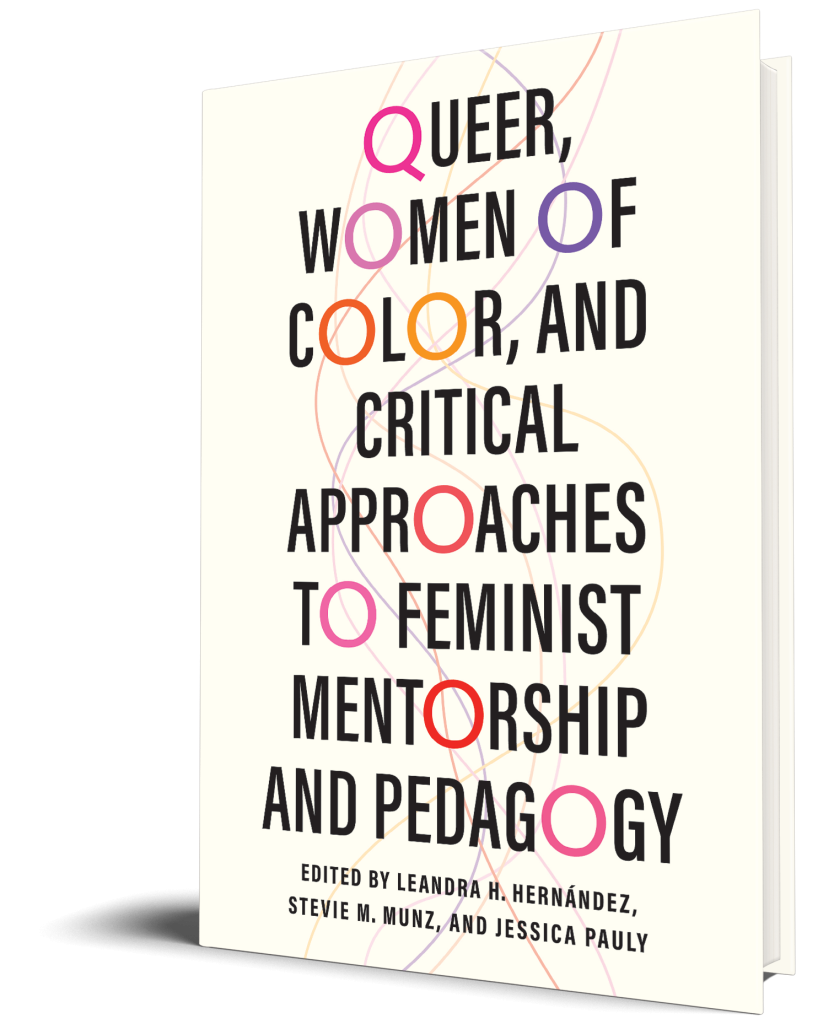Leandra H. Hernández, Stevie M. Munz, and Jessica Pauly, editors of Queer, Women of Color, and Critical Approaches to Feminist Mentorship and Pedagogy, answer questions about their new book.

Q: Why did you decide to write this book?
Jessica Pauly (JP): This book came about after two significant experiences: (1) Working closely with our students and valuing the opportunity to mentor them with care, and (2) experiencing pay inequity, which bonded us together through feminist mentorship.
Stevie M. Munz (SM): I concur with Jess, here.
Leandra H. Hernández (LH): We also noticed that there was a lack of scholarship on queer and critical approaches to feminist mentorship, so we hoped to fill that gap with our co-edited book.
Q: What is the most interesting discovery you made while researching and writing your book?
JP: Feminist mentorship is practiced far and wide! What’s more, the forms and models of feminist mentorship are incredibly varied and beautifully diverse.
SM: I knew (feminist) mentorship was personal, but it is also deeply situated and contextual—the stories shared gave us glimpse into varied and different realities.
LH: That there is power in collaboration and collective empowerment, which is evidenced in the stories included in our book. I think we always knew this beforehand, but it was hopeful and heartening to see the stories emerging, particularly in our current cultural and political moment.
Q: What myths do you hope your book will dispel or what do you hope your book will help readers unlearn?
JP: I hope our book helps readers revise their understanding(s) of mentorship to include the variety of practices illuminated by the brilliant scholars who’ve shared their experiences and ideas.
SM: The efforts are never over. We must remain committed to the endeavor and purpose of feminist mentorship in all spaces.
LH: There are multiple modes of, theoretical approaches to, and embodied experiences of feminist mentorship. While our book is certainly not an exhaustive approach to queer, feminist, and women of color mentorship, we hope that it will lend to new discoveries for readers.
Q: Which part of the publishing process did you find the most interesting?
JP: I found the initial book proposal process most interesting. Sitting down to write out ideas, articulate and organize them, note similar published books, etc., was both challenging and enjoyable.
SM: I loved reading and re-reading the stories 🙂
LH: The meta- and micro-level mentorship approaches that we experienced while writing about mentorship! For us, co-edited books are also an important form of bridge-building and mentorship as we work together to cultivate ideas and build relationships.
Q: What is your advice to scholars/authors who want to take on a similar project?
JP: Go for it! It’s a labor of love and joy.
SM: 100% go for it. Working with a wonderful press and colleagues is so rewarding.
LH: Be clear with your co-editors up front and early about expectations, timelines, back-up plans for delays, and how to cultivate joy with each other while working on the project. I’m so thankful to have worked on this project with my sister-scholars who are also my close friends.
Q: What do you like to read/watch/or listen to for fun?
JP: I enjoy reading/watching/listening to case studies, documentaries, and current news stories pertaining to topics I’m deeply invested in (e.g., gender, diversity, religion, organizing).
SM: I’m always listening to history documentaries—the more obscure the better.
LH: I am a hardcore/metal music fan and true crime/horror enthusiast. I normally write and edit all of my projects while listening to hardcore/metal music or having horror/sci-fi movies play in the background. It’s my life soundtrack!
Leandra H. Hernández is an associate professor of communication at the University of Utah. She is the coeditor of Supporting the Military-Affiliated Learner: Communication Approaches to Military Pedagogy and Education and other books.
Stevie Munz is an associate professor of communication at Utah Valley University. She is the coauthor of Mobile Devices and Technology in Higher Education.
Jessica Pauly is an adjunct professor of communication at Northeastern University.
